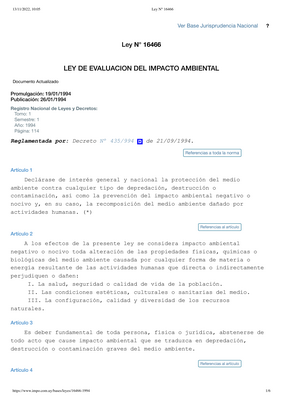Summary
The Environmental Impact Evaluation constitutes a system to identify, prevent, supervise and control the negative environmental impact arising from investment projects. Relevant subjects, before they start their activities and operations, must follow a process of environmental certification. This will involve describing the proposed action and the background, reporting information that identifies any direct and indirect environmental impacts during the project, environmental risks, goals, monitoring and control plans. Provisions on mandatory information disclosure include: a) identification of the owners of the property where the project will take place; b) the project signed by the designated technician(s), with a detailed description of its content; c) the environmental impact assessment signed by the technician(s); and d) a summary of the project in easily understandable terms containing the essential features of it, as well as any impact that may derived from its execution.

We have sent you the download link, please check your inbox.
Download againSomething went wrong when trying to download this file.
Try again